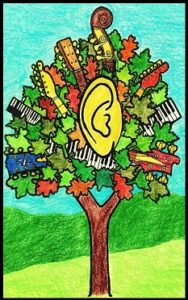 You should see some of the reactions from experienced musicians when they break free from the tyranny of written music for the first time. When classically-trained musicians learn that they can create music without any written instructions, there is often a visible catharsis. Watch a group of classical musicians on their first day of jazz improvisation class at your local community college, and you’re likely to see what I mean.
You should see some of the reactions from experienced musicians when they break free from the tyranny of written music for the first time. When classically-trained musicians learn that they can create music without any written instructions, there is often a visible catharsis. Watch a group of classical musicians on their first day of jazz improvisation class at your local community college, and you’re likely to see what I mean.
In his book, Searching For The Sound, Grateful Dead bassist Phil Lesh described improvising for the first time, playing a gig on trumpet with a school dance band. The leader asked him to improvise something. Lesh said that one experience changed his life and his idea of music forever. Classically–trained blogger Steve Giddings described the sensation of improvising as “surreal,” like an “out of body experience.” Paco de Lucia said in interviews that when he first started performing with musicians like Al Di Meola, the stress of having to improvise gave him headaches.
For many musicians, improvising for the first time means breaking out of the “traditional” musicians’ mindset. This is disorienting for a couple of reasons. First, there’s the surprise of discovering that there’s a “mindset” to break out of in the first place. Then there’s the surprise of discovering another mindset is possible. Over time, you learn how to reconcile the fixed “traditional” mindset with the “modern,” improvisational mindset. You learn how to reconcile structure with spontaneity and intuition, to the extent they can be reconciled.
Personally, I never had a revelatory experience like Phil Lesh’s, because I learned guitar by ear. Rock musicians take the feeling of “freedom” you get from creating music in real time for granted.
Forays by classical musicians into the world of modern music don’t always end happily. There was a talented classical violinist in my college Jazz Improv class. At first, she was confident she could learn to improvise. But even though she was the most technically proficient musician in the class, she was plagued with self-doubt from the start. The class was supportive, but she was relentlessly self–critical of everything she played.
I recognized two problems right away. First, she had never really listened to any music in the style she was improvising in. She was imposing the standards she learned from classical music onto jazz improvisation, so she perceived everything she played as sub-standard. The second related problem was she didn’t have a clear understanding of modal blues harmony.
It turned into a full-fledged psychological crisis that went on for weeks. She showed up in the middle of class one day, completely dejected, close to tears, and announced she was dropping the class. The Jazz Improv experience had badly shaken her confidence as a musician. She hated having a dropped class on her college transcript. In the end, she was sorry she ever brought up the subject.
If she had more exposure to a wider array of modern music styles, and a better understanding of common idioms in blues and jazz, then she would have had a different outlook on improvising. Simply listening to a little music, and familiarizing herself with a little relevant musical history, would have informed her sense of modern musical values. Her problem was she didn’t listen to enough of the kind of music she was trying to play.
Cases like this are a reminder that learning to read music well is a worthwhile goal, but total dependency on written music is nothing short of a debilitating mental condition which, unfortunately, afflicts a large percentage of classically-trained musicians.
© 2019, 2020 Greg Varhaug